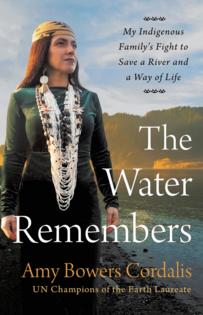Review: How one woman spoke for the river in 'The Water Remembers'
Published in Books News
Amy Bower Cordalis’ “The Water Remembers” does not flow in a straight line.
Her book “is written in the format of Yurok [the largest Native tribe in California] storytelling,” she writes, meandering here and there, much like the Klamath River that supported her people for millennia.
No spoiler alerts necessary here. The title tells all. Cordalis and a group of leaders from several Native nations took on powerful interests to rescue a dying river.
But this is more than a feel-good environmental story. At its heart, “The Water Remembers” is an Indigenous “Fiddler on the Roof”: about tradition, about prejudice and — like “Fiddler,” a macro story told in clear and understandable microfashion — about family.
Cordalis’ Yurok people live in Northern California, around the Klamath River, which flows from the Cascades of southern Oregon to the Pacific. It was once home to the third-largest salmon run in the U.S.
The Yurok have been there since “the Creator told my ancestors ... that all of this was made for them. They would never want for anything if they lived in balance with this world.”
Sadly, the contemporary Yurok story is less about balance than land stolen, treaties abrogated, children — including Cordalis’ great-grandmother — forcibly taken to a boarding school as part of a 20th-century campaign to “kill the Indian and save the man.”
Between 1911 and 1964, four dams were built along the river, cutting off several species from their spawning ground. About 240,000 acres of pristine farmland were auctioned off to white farmers who received contractual water rights to irrigate their crops.
For a while, Indigenous people were not allowed to fish in the river that had been theirs since time dawned. Later, they couldn’t fish, even when granted permission.
The combination of dams, chemical runoffs from farms, climate change and drought caused toxic algae blooms. In 2002, there was a massive fish kill that ultimately spurred several tribes to actively oppose PacifiCorp’s application for a 50-year renewal of its license to run the dams.
It was approved, but with the proviso that the company must add fish ladders to each dam. Installing ladders cost twice as much as leveling the dams, ultimately, so the company modified its stance. Yet, even with PacifiCorp’s agreement, the process took years.
It was completed last year, and in what might be seen as Mother Nature’s justice, a decadelong drought ended, rainstorms increased the river’s flow and sediment that had accumulated behind the dams washed away.
It’s easy to get angry, reading about the bigotry and stupidity the Indian nations had to endure. But, once in a while, the Yurok storytelling takes us to a passage that makes you forget anger. For example:
The Yurok have a tradition, in times of war, to send women to attempt to negotiate peace first. Only if they fail do men get involved.
Damn (not “dam”), that’s really cool.
Cordalis is an attorney but, more importantly, a United Nations “champion of the Earth” who helped lead the fight to save a dying river and protect her Yurok Nation’s way of life.
____
The Water Remembers: My Indigenous Family’s Fight to Save a River and a Way of Life
By: Amy Bowers Cordalis.
Publisher: Little, Brown. 273 pages.
©2025 The Minnesota Star Tribune. Visit at startribune.com. Distributed by Tribune Content Agency, LLC.












Comments